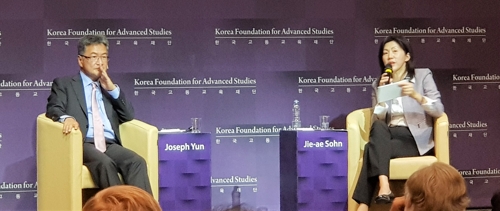U.S. President Donald Trump's strategy on North Korea's denuclearization is "going very hard and seeing what happens," analogous to his handling of trade deals with other countries, a former U.S. diplomat said on Oct. 22, 2018.
During a lecture in Seoul, Joseph Yun, former U.S. special representative for North Korea policy, also reiterated the importance of engagement with Pyongyang, pointing to a "new equilibrium" where the communist state has stopped provocations, such as nuclear and missile tests.

"I do think there is a strategy. It has been the case with his approach to China in the trade war. It is the case with his approach to Korea-U.S. free trade agreement. It is the same approach to NATO and the same approach to NAFTA. He wants to go very hard and then see what happens," he said.
"I think we saw the very hard stage which was 2017 and then the pullback stage. Now, I think he is waiting because he's pulled back ... he is waiting for some kind of significant gift from Pyongyang which has, I believe, not come yet," he added.
As for that significant gift, Yun enumerated a series of steps Pyongyang can take even though they may fall short of complete denuclearization.
The steps include the dismantlement of the North's main Yongbyon nuclear complex and a declaration of its nuclear inventory that includes nuclear sites, materials and weapons.
Yun noted that now there is a new equilibrium or new normal where tensions are reduced with no North Korean military provocations. But uncertainly still lingers.
"It may be entirely possible that Trump is quite happy with what he has gotten so far: reduction in tensions and no missile tests and sites being destroyed.
"This is what I called a new equilibrium, and is this sustainable? How long? Certainly, it would go on until the end of this year ... Is this sustainable throughout next year and until the 2020 election? I don't have an answer to that," he said.
The former diplomat also stressed the need to build trust between Washington and Pyongyang to facilitate their peace efforts by taking small steps such as establishing liaison offices and initiating humanitarian engagement and cultural exchanges.
Asked about the prospects of sanctions relief for Pyongyang, Yun said it would not be easy to lift U.N. Security Council sanctions and stand-alone U.S. sanctions.
"It would take (the) U.N. Security Council voting to remove those sanctions. That is going to be difficult because a lot of sanctions have very clear language that sanctions are to remain in place until there is complete denuclearization," he said.
"The unilateral sanctions ... those are mostly implemented as legislation from Congress. So again there has to be legislative action that goes about removing those sanctions," he added.
But he pointed out that sanctions could be tempered through such measures as giving the North sanctions waivers.

